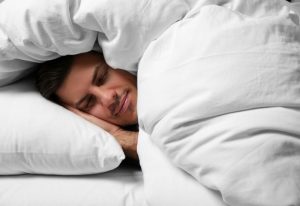Sleep is absolutely essential to good health. Modern science has demonstrated numerous ways that sleep quality is directly linked to both physical and mental health. When something disrupts your sleep, impacting sleep quality or quantity, it can also potentially impact your physical health, cognitive function and mental well-being. Surprisingly, winter can fall into that sleep disrupting category. Winter affects your sleep primarily via its impact on your circadian rhythm and also by its influence on your day-to-day habits and behaviors.
Winter Can Impact Sleep

Others report both feeling tired and having difficulty falling asleep and waking up at their usual times, frequently getting less sleep than usual or suffering a decline in their overall sleep quality.
Light Linked to How Winter Affects Your Sleep
One of the primary ways that winter affects your sleep has to do with the impact the season can have on your circadian rhythm. One of the regulatory tasks the circadian rhythm performs is the timing of the sleep-wake cycle. The mechanics involved in that regulatory process are complex and include the timing of the production and release of such hormones as melatonin. This hormone is important to the sleep-wake cycle, as its higher nighttime levels promote sleep and suppressed daytime levels promote wakefulness.
The circadian rhythm relies heavily on external cues to stay in sync. That is because the foundation of this fundamental rhythm is the approximately 24-hour cycle of light and dark that all life on Earth has evolved in concert to. Thus, it should come as no surprise that light is the most powerful of the environmental cues impacting the circadian rhythm. The winter months bring two important changes to light – fewer hours of daylight and, due to the position of the Earth on its axis during this season, a less intense light during daylight hours.
Those light changes on their own can be disruptive, especially to those who are more sensitive to such changes, such as those dealing with seasonal affective disorder (SAD). However, our light-related responses may compound the issue. Instead of having the opportunity to gradually and naturally adjust to the changing light levels, many people are impacted by the change from Daylight Saving Time to Standard Time. When the time moves back an hour, it abruptly gets dark earlier by the clock. In addition, shorter days typically mean more artificial light exposure during evening hours. Evening artificial light exposure is disruptive to both the circadian rhythm and to the sleep-wake cycle.
These shifts in light can be disruptive to the timing of melatonin production, which in turn impacts when we feel sleepy. Leaving for work or school when it is dark and getting out when it is almost dark can dramatically decrease natural light exposure. That can have a negative impact on circadian rhythm health, thereby also impacting sleep timing and quality.
Other Ways Winter Impacts Sleep
Inclement weather often leads to less physical activity. Going out for a bike ride, walk or even just to head out to the gym can seem less appealing when it is cold outside. Getting enough physical activity each day is linked to both falling asleep more easily and enjoying better quality sleep. Physical exercise also has a role in maintaining circadian rhythm health, especially when it is part of a daily routine.
The daily diet also changes for many people during the winter months. Aside from the tendency to indulge a bit more during the holiday season, many people eat more fat- and carbohydrate-heavy comfort food during the cold months. Prices for fresh produce are often higher during the winter months, which can impact the daily diet. These dietary changes can impact sleep quality, sleep timing and the circadian rhythm, especially when those changes yield a disrupted meal schedule, a less healthy diet overall and heavier evening meals.
Take Steps to Maintain Sleep Cycle and Circadian Rhythm

Be more light aware, making sure to get bright morning light exposure, even through a window, and avoid bright artificial lights, including electronics, in the two to three hours before bedtime. If you are more sensitive to the winter light changes, consider a melatonin supplement to help ease your seasonal transition and avoid sleep disruption.







